- Home
- Suzanne Selfors
Saving Juliet Page 3
Saving Juliet Read online
Page 3
Steady snowfall had turned our brownstone into a frosted gingerbread house. I thanked the driver and stepped cautiously onto the slick sidewalk. Larry, our neighbor, was also returning home. A large, silver cross swung from his neck as he tried to keep from slipping. "Hello, Mimi," he greeted, holding an umbrella above my head. He offered a fat arm as well. "Good performance?"
"I barfed all over the stage."
He laughed. He thought I was joking.
"No, really. I puked up my dinner in front of everyone."
"Holy St. Francis," he said, shaking his head. Then he gave me a kindly pat on the back. "Look at the bright side. That's a performance no one will soon forget."
I collected the day's mail and took the stairs to the second floor. Silence and cold air greeted me as I stepped into our apartment. A lingering aroma of lemon Pledge meant that the cleaning lady had been there earlier. Neither my mother nor I spent much time at home so it lacked our own personal smells. We didn't have any pets or plants, unless you counted a pathetic cactus that refused to die. The place was tomblike in its lifelessness.
I locked the door, turned up the heat, and dumped the mail, my gloves, and my backpack onto the kitchen table. My stomach growled as I opened the refrigerator. We used a catering service--a woman who cooked our meals for the week and put them in tidy paper containers. My mother insisted on low-calorie, low-fat entrees, which was why my father used to spend so much time at the diner on the corner, savoring sausages and gravy-drenched mashed potatoes-- contributing, no doubt, to his heart disease. I pulled out a box labeled Sun-dried Tomato Pilaf, and popped it into the microwave.
The night had been a complete disaster. During past performances of Romeo and Juliet, I had managed to keep the stage fright backstage. Sure, my Juliet may have appeared more nervous than most Juliet's, a bit more wild-eyed, nothing more than that. But that night what I feared might happen had. What would the next night bring? Loss of bowels?
While the microwave hummed I pulled off my hat and started muttering to myself, a perfectly normal thing to do when there's no one else to talk to. Solitary muttering allows you to say all those things you don't have the courage to say to all those people who are driving you nuts. I told Clarissa she had no right to judge me. I told Troy he was a jerk for making me think I actually "liked" him. I told my mother to stop controlling my life. I told my father I would never forgive him for dying so young and leaving us with that cruddy theater. And I told William Shakespeare that Romeo and Juliet totally sucks because everybody just dies and none of the characters get what they want. What kind of ending is that, anyway? I'd totally write a different ending.
I sat at the kitchen table and took a few bites of pilaf. The center was still cold but I didn't care. When you're riddled with anxiety, food gives you no pleasure. A brown, padded envelope stuck out of the mail pile. It was addressed to me with a return address from World Family Clinic, Los Angeles. My aunt's clinic.
At that time, my mother despised my aunt Mary. They had had a big falling-out after my father died. Mom went through the house and threw away all the photos of Mary that she could find. I found a forgotten photo, buried beneath some mismatched cuff links. The photo had been taken after Mary graduated from medical school and had gone off to Africa. In it she's wearing a white smock and stethoscope and is surrounded by children with purplish black skin.
One day, my mother found the photo in my room. "For God's sake, why do you have that?"
I had spent a great deal of time staring at the photo, wondering how it felt to live in a place where people had so little. "Why don't we ever see Aunt Mary anymore?"
"She's selfish. She abandoned your father."
"But she helps the poor."
"There are plenty of poor in New York City. Why couldn't she be a doctor here? We needed her help with the theater when your father fell ill. Wallingford is her name, too." Despite a series of strokes, my father had continued to serve as executive director of the Wallingford. My mother was convinced that work-related stress finally killed him. She told everyone that if Mary had stepped in, he would still be alive. A blood clot had actually killed my father, formed from frosted doughnuts, fried catfish, and greasy diner sausages.
A fast food addiction wasn't the only thing that good old Dad had been hiding. Turns out we were in debt, big time. He had taken out a number of loans to keep the theater afloat, all the while we wore expensive clothes and hosted fabulous parties. No one suspected that we hovered on the brink of poverty, not even my mother.
After Dad's funeral, Mary went off to New Zealand for two years, then to Costa Rica. She always called to check up on me, always asked about the plays, the theater, even about Mom. She told me that American doctors can work anywhere in the world. Anywhere. That sounded exciting. I began to imagine myself in that white smock and stethoscope. When she moved to Los Angeles a few years ago to open her own clinic, I realized the possibilities were endless.
I pushed the pilaf aside and opened the padded envelope, pulling out a letter and a small something wrapped in tissue paper. Inside the tissue lay a silver chain, from which hung a tiny glass vial filled with silver powder. I read the letter.
Dearest Mimi,
I was so unnerved by your last e-mail that I spent the night searching through all my old psychology textbooks, trying to find something that might help with your stage fright. I agree with Dr. Harmony about centering techniques, but it sounds like things are getting worse. I think a change of scene is what you need. I can hardly wait to see you next week. Don't forget your bathing suit!
Love, Aunt Mary
P.S. While rummaging through my old boxes, I found this necklace. I bought it at an antiques shop in Stratford-on-Avon before I went off to college. The owner said it was very rare but I suspect it's just a tourist trinket. Fun idea, though. Maybe it will bring you good luck during these last days of performing. Can't hurt to give it a try.
A little card was paper-clipped to the back of the letter. It read:
Shakespearean Charm
In 1890, Mr. Burtrand, a merchant and collector of William Shakespeare's writing implements, decided to auction off his collection. Unfortunately, on the eve before the auction, a fire overtook his house, destroying everything.
Being a merchant of clever mind, Mr. Burtrand scooped up the ashes of the burned implements and poured them into small bottles. He claimed that he had captured the genius that had traveled from Shakespeare's hand through his favorite quills.
This is one of those very bottles. Whether the ashes come from the quill that wrote Hamlet, Twelfth Night, or Romeo and Juliet, they are certain to influence your destiny.
I examined the tiny vial. Probably ashes from someone's fireplace. But the fact that it came from Aunt Mary cheered me up a bit.
However, the good feeling was short-lived. As I shuffled through the rest of the mail, my mother's words filled my head. You need to reach an audience beyond New York. I shuffled faster. Theatre Institute training is exactly what you need to reach your full potential. I threw the bills across the room and slammed my palms on the table. Damn!
I tossed the remaining pilaf into the garbage. I just wanted to go to bed and disappear into a dreamworld where I was an orphan. Orphans always complain about their status but it sounded lovely to me. While collecting the scattered mail, one of the envelopes stuck to my boot. I tried to shake it free but it wouldn't budge. Focusing all my anger on that envelope, I stomped on it and ground it into the floor until it ripped open. Then I reached down and removed it from my heel. I had seen this envelope many times. It came every so often from Stronghead Financial Planners, addressed to Veronica Wallingford. The words trust fund peeked out from the torn paper. I pulled out the statement.
Looking back, I realize that I was completely ignorant about money matters. I knew that there were times when we had money and times when we didn't have money. I knew that as a professional actor I received a paycheck and that it went directly into a trust fund. I k
new that I would get that trust fund when I turned eighteen. I never questioned this arrangement.
The next words I noticed were beneficiary: Michelle Adelaide Wallingford. My trust fund. The fund where all my money went. What a discovery! I found the balance column. $532. Excuse me? From my calculations, that figure was missing quite a few zeros. I moved my finger to the debit column and held my breath. A withdrawal with quite a few zeros glared back at me.
A withdrawal? I hadn't taken any money from my trust fund.
I carried the statement to my bedroom and closed the door. The cleaning lady had tidied my bookshelves and had stacked my pillows. I dropped the shocking evidence onto my bed, expecting it to burn a hole through the quilt. My mother was spending my money. Was that legal? Orphans don't have mothers who steal from them.
After changing into my nightgown and brushing my teeth, I turned off my bedroom light and sat on the windowsill, pressing my cheek against the snow-speckled glass. The cold felt oddly soothing. The old lady in the apartment across the street was watching television. Her feet poked out of the end of a crocheted blanket. Her black-and-white cat sat on the windowsill, his usual perch. In the morning he always watched the birds and squirrels that hung out in the maple tree. That night he pressed his face against the glass, just as I did.
Did he feel trapped as well? Captive in a life he had not chosen for himself? If he could, would he jump out that window? Would he risk it all and cross the street, running toward the beckoning limbs of the maple?
As I cupped the Shakespearean charm, the black-and-white cat mouthed a meow, then lay down to sleep, giving in to his imprisonment.
What we desire and what we do--as different as a Shakespearean sonnet and a Troy Summer song.
Four
***
"Of all base passions, fear is the most accursed. "
The next evening I sat in the limo as it made its way to
A the theater for the final performance of Shakespeare's beloved tragedy. Usually my feelings of panic didn't set in until I stepped onto the sidewalk. But that night, as soon as we pulled away from the apartment building, my armpits began to produce sweat at an athlete's pace. My heartbeat kicked up two notches and dread wormed its way through my limbs.
Ever had a panic attack? You know how some people tell you to look at the bright side of things, to look at a cup as half full instead of half empty? There is no bright side to a panic attack. And I was about to have one.
The fact that I hadn't slept the night before didn't help. I hadn't been able to get that trust fund statement out of my head. I had tried to call Stronghead Financial Planners but, it being Sunday, all I got was a recorded message. If I really wanted an answer to where my money had gone, I'd have to ask the person sitting next to me in the limo.
"Your future may very well rest on your performance tonight," my mother said.
Hello? I'm a wreck over here. How about some compassion?.
I clenched my jaw and tried to block out her voice by reciting my centering mantra. "Om ya, om ya, om ya."
"There is no better school than the Theatre Institute." She brushed something from my coat sleeve. "In order for you to grow as an actress, you must get the very best training or you might end up on one of those horrid soap operas like your second cousin Greg."
I narrowed my eyes until she blurred, her worried face melting into her fur collar.
"Why are you looking at me like that?" she asked.
"Like what?"
"You know very well what I'm talking about. That look that you're doing, right now. That look."
Go away. Leave me alone. You're making me crazy.
"Mimi. Answer when I speak to you."
Here we go. I couldn't stop myself. I no longer cared that she was stressed out and unfulfilled. I was ready to fight her guilt trip with one of my own. "Why are you withdrawing money from my trust fund?" She played it cool. She wiped some lipstick from the corner of her mouth, then opened her purse and began to sort through its contents. "Why are you taking money from my trust fund?" I demanded, turning my voice up another notch.
"How dare you shriek at me." She flicked open a compact. "I'm not taking your money. I'm borrowing it."
"But it's my money."
"And I'm your parent. The money is under my trusteeship until you turn eighteen. It's all perfectly legal and nothing for you to worry about."
"What did you do with it?"
"The theater couldn't manage the salaries last quarter. But thanks to Troy and his hungry fans, we're close to coming out of the red." So, Troy and I were financing the theater. "All the money will be returned to your account, eventually."
"Eventually?" That didn't sound good.
Then she tried to turn things on me. "How do you know about this? Have you been opening my mail? That is not respectful, Mimi."
Neither is borrowing someone's money without asking. Sweat broke out behind my knees. "We never talked about this. I worked hard for that money."
"You worked hard?" My mother looked like I had slapped her. "Don't forget, young lady, that single parenting is the toughest job on the planet. But I don't expect you to appreciate my sacrifices. You're too young." She reached into her purse and took out a tissue, which she pressed to the corner of her eye. "We shouldn't be arguing. You must focus on your future. Focus on your dream."
"It's not my dream," I mumbled. "It's your dream. There's a big difference."
"You're being ridiculous, Mimi. Then just focus on your performance. It's closing night."
But it wasn't really closing night, not for me. Without my trust fund, I couldn't afford UCLA or even Backwoods Technical College. I had to face facts. I would act at the Wallingford until my teeth fell out and my bones turned brittle from osteoporosis. Until my skin turned so wrinkled and papery that the next generation of Fernandos would have more to complain about than my spaghetti-thin lips. Stage after stage, audience after audience, review after review. I'd be buried in a Queen Gertrude costume, just in case God's a fan of Hamlet.
As we turned the corner and the theater came into view, dread pressed on my chest. Girls were lined up, huddling together against the cold. My mother started in again. "The admissions committee and Reginald Dwill will be seated with me in the sixth row center. Don't disappoint us."
Suddenly I couldn't get a full breath of air. I clutched my knees and closed my eyes as my heart sped out of control. My mother's voice grew distant, her words decomposing into mumbo jumbo. The leather seat pressed against me, the doors of the limo closed in. The air turned into smog. I was suffocating, drowning. Where could I go to escape this sensation? What had happened to all the air?
"Mimi!" My mother stood on the sidewalk, peering at me through the open passenger door. "Mimi, why are you just sitting there?"
I couldn't move. I wanted to move. I wanted to run down the street, run as far away from the theater as possible. But I sat, sweat running along my spine and down my butt crack. If my heart beat any faster, it would burst through my coat.
My mother poked her head in. "Mimi, why are you breathing like that? Oh God, don't tell me you're going to be sick again?"
It's almost impossible to communicate in the middle of a panic attack. When the fight-or-flight response takes over, words are useless, thoughts are single-minded. All I knew was that I couldn't go in there. I would completely lose control. I would vomit all over the stage and forget all my lines and totally screw up my future. I would get stuck on a soap opera with second cousin Greg, where, at the very least, I'd get to play a doctor.
Clarissa and a few actresses walked by. "What's going on?" Clarissa asked, peering over my mother's shoulder. "Oh, is she freaking out again? Does that mean I get to go on?"
"She is not freaking out." My mother shooed them away, then stuck her head back in. "You can't be doing this. Not tonight."
I imagined myself running across the street, racing down endless sidewalks, my feet taking me far away from the Wallingford Theatre. Somewhere
else. Anywhere else. My head spun and I leaned forward, gagging.
"You're doing this on purpose," she accused. "Just to hurt me. After all my hard work, after inviting the admissions committee here. This is all just an act, isn't it, Mimi? You don't really have stage fright, do you? Well, this is the best acting you've done yet."
I shook my head.
"Don't lie to me. I know melodrama when I see it. I'm the queen of melodrama." She got back into the limo and shut the door as the driver waited politely on the sidewalk. She took my shoulders. "Most people go through life without the kind of opportunities that you've been given. And life goes by very quickly, Mimi, believe me." Her voice, though stern, grew a bit softer but she continued to squeeze. "You don't think I remember what it was like to be seventeen? You don't think I remember all those feelings and desires? All the uncertainty about the future? I'm trying to save you all that uncertainty. Face it, Mimi. This is the only thing you know how to do. Your future is here, right now, and it will be glorious. You just have to pull it together. If not for yourself, if not for me, then do this for your father."

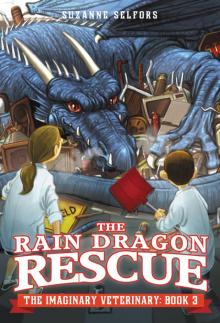 The Rain Dragon Rescue
The Rain Dragon Rescue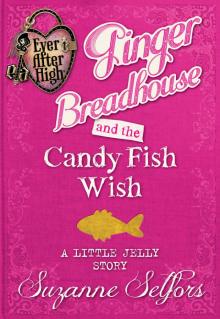 Ginger Breadhouse and the Candy Fish Wish
Ginger Breadhouse and the Candy Fish Wish Ever After High: Lizzie Hearts and the Hedgehog’s Hexcellent Adventure: A Little Shuffle Story
Ever After High: Lizzie Hearts and the Hedgehog’s Hexcellent Adventure: A Little Shuffle Story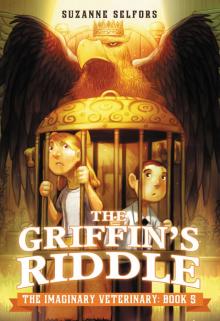 The Griffin's Riddle
The Griffin's Riddle Smells Like Pirates
Smells Like Pirates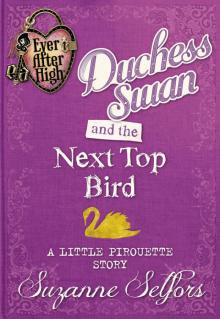 Duchess Swan and the Next Top Bird
Duchess Swan and the Next Top Bird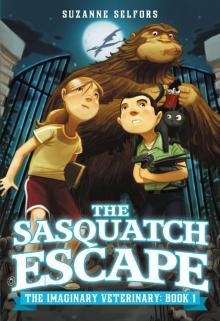 The Sasquatch Escape
The Sasquatch Escape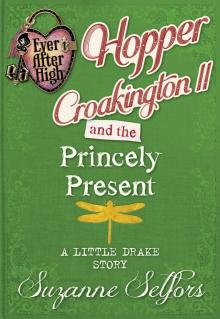 Hopper Croakington II and the Princely Present
Hopper Croakington II and the Princely Present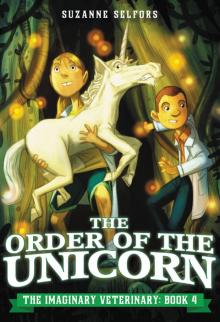 The Order of the Unicorn
The Order of the Unicorn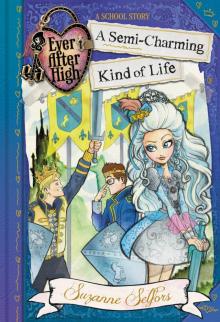 A Semi-Charming Kind of Life
A Semi-Charming Kind of Life Braver
Braver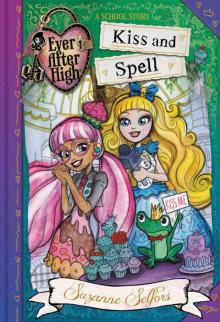 Kiss and Spell
Kiss and Spell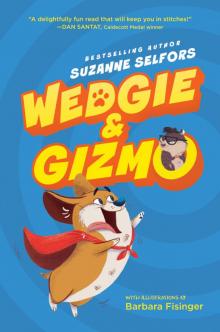 Wedgie & Gizmo
Wedgie & Gizmo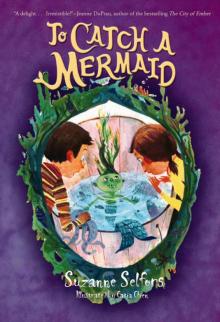 To Catch a Mermaid
To Catch a Mermaid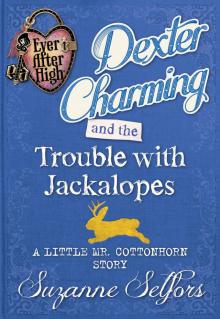 Dexter Charming and the Trouble with Jackalopes
Dexter Charming and the Trouble with Jackalopes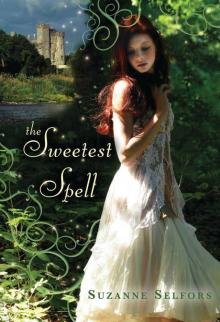 The Sweetest Spell
The Sweetest Spell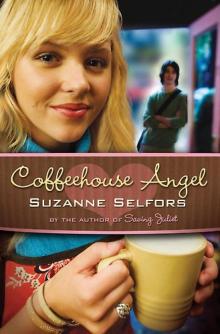 CoffeeHouse Angel
CoffeeHouse Angel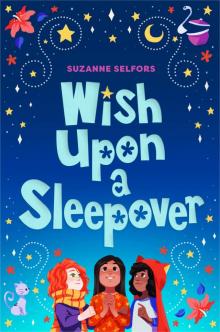 Wish Upon a Sleepover
Wish Upon a Sleepover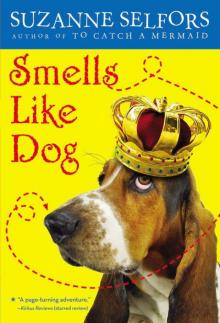 Smells Like Dog
Smells Like Dog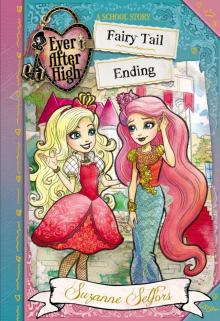 Ever After High
Ever After High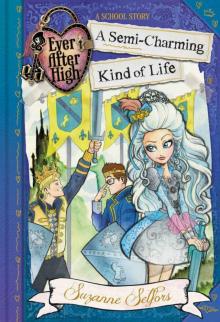 Ever After High: A Semi-Charming Kind of Life
Ever After High: A Semi-Charming Kind of Life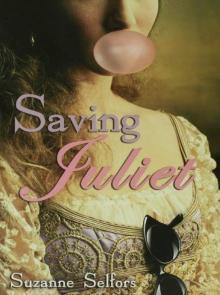 Saving Juliet
Saving Juliet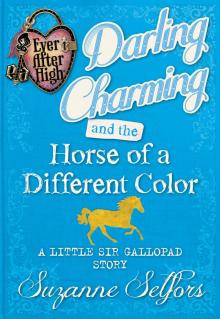 Darling Charming and the Horse of a Different Color
Darling Charming and the Horse of a Different Color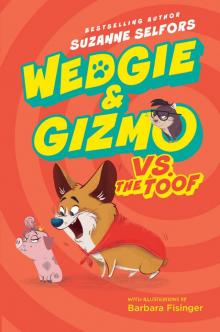 Wedgie & Gizmo vs. the Toof
Wedgie & Gizmo vs. the Toof Spirit Riding Free--The Adventure Begins
Spirit Riding Free--The Adventure Begins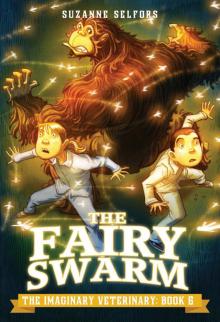 The Fairy Swarm
The Fairy Swarm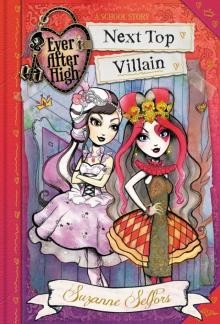 Ever After High: Next Top Villain: A School Story
Ever After High: Next Top Villain: A School Story Fortune's Magic Farm
Fortune's Magic Farm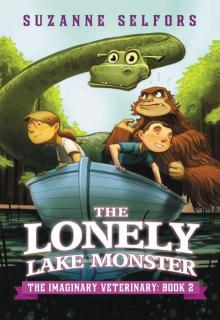 The Lonely Lake Monster
The Lonely Lake Monster Spirit Riding Free--Lucky and the Mustangs of Miradero
Spirit Riding Free--Lucky and the Mustangs of Miradero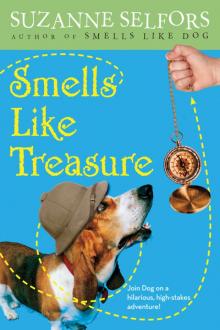 Smells Like Treasure
Smells Like Treasure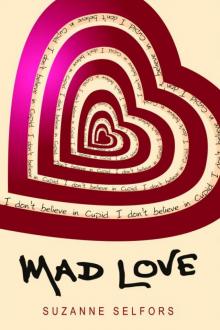 Mad Love
Mad Love